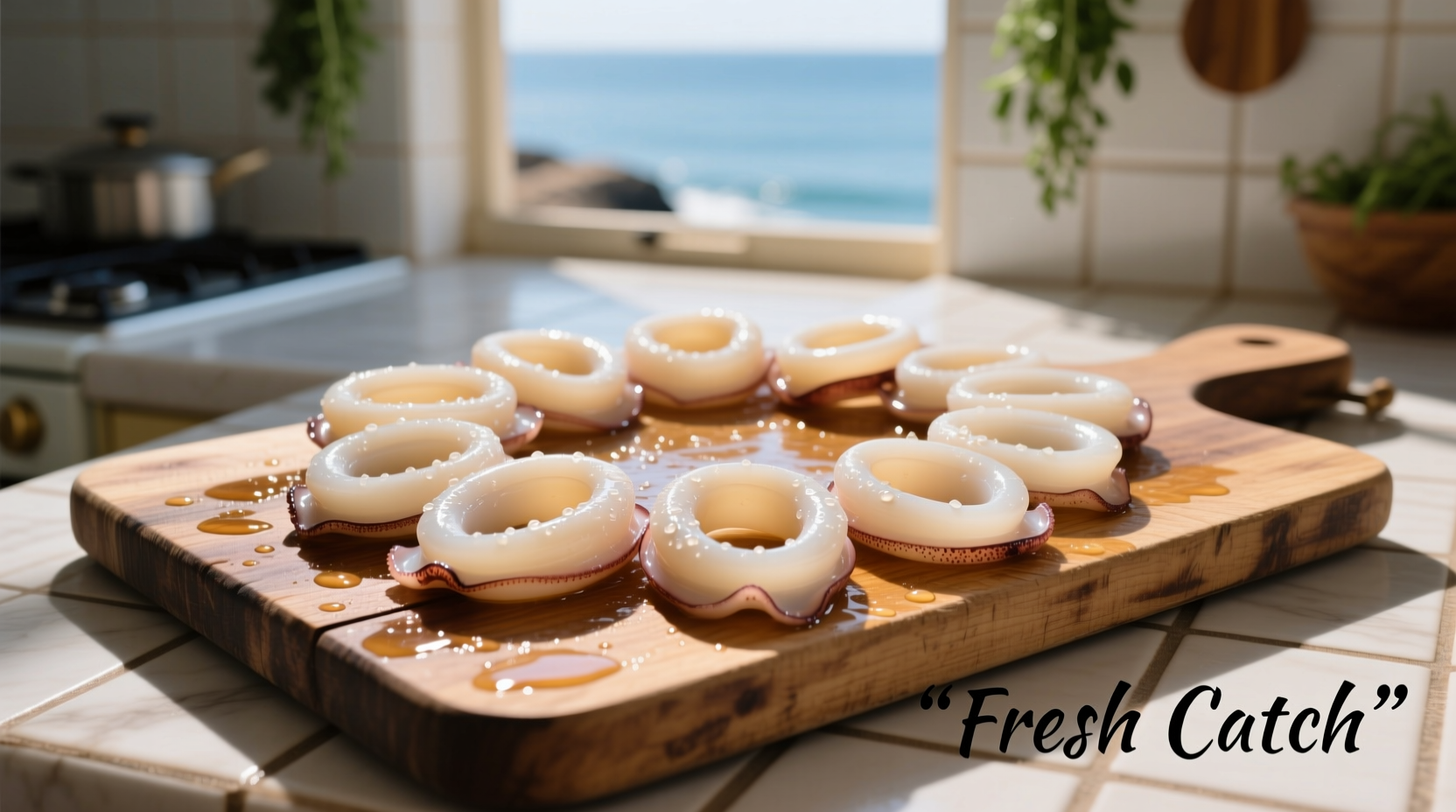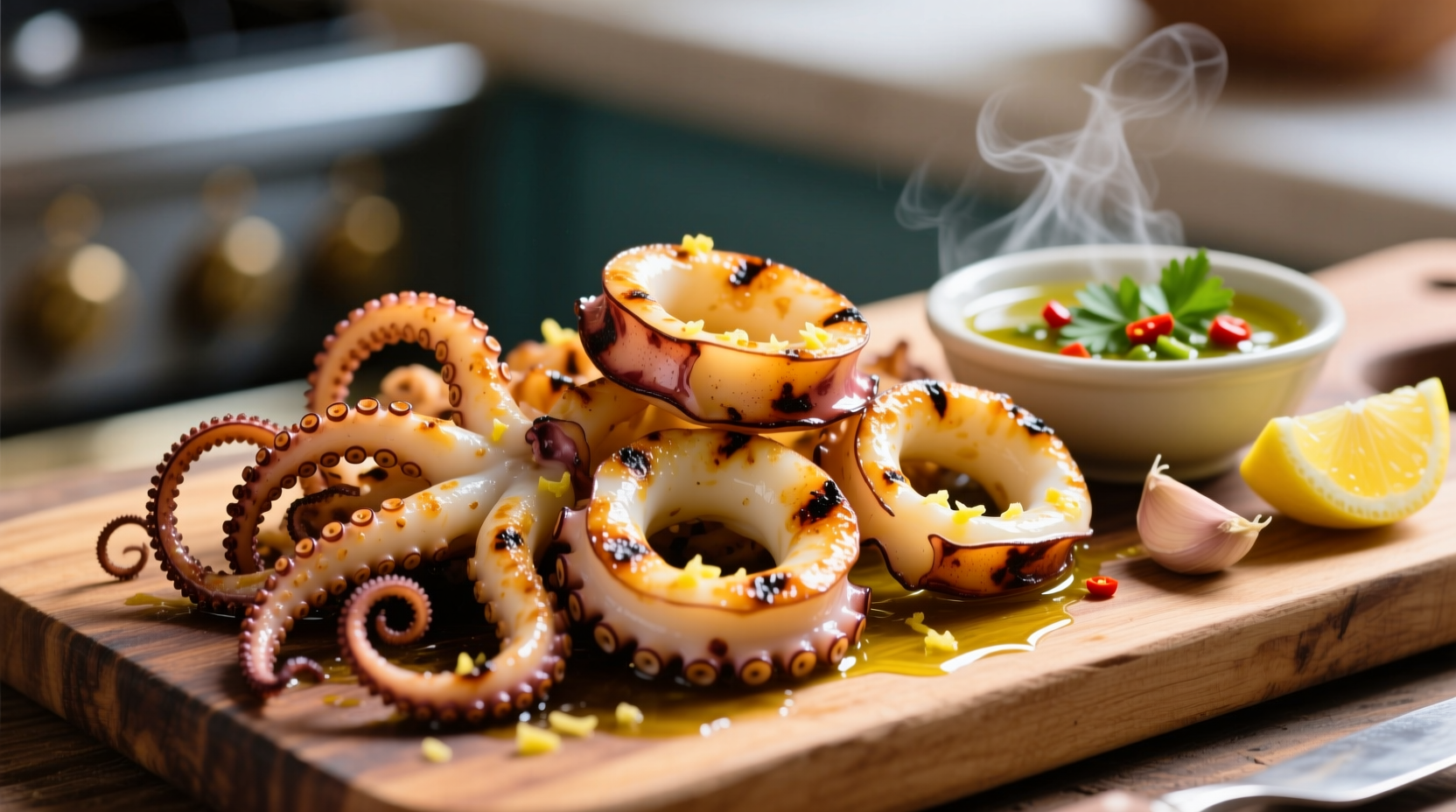Understanding Calamari: More Than Just a Menu Item
Before exploring taste, it's essential to clarify what calamari actually is. Calamari refers specifically to prepared squid, not a distinct sea creature. The term comes from the Italian word for squid, and in culinary contexts, it describes squid that's been cleaned, sliced, and prepared for cooking. Many diners don't realize they're eating squid when they order calamari at restaurants.
Deconstructing Calamari's Flavor Profile
When properly prepared, calamari offers a surprisingly subtle taste experience. The flavor can be described as:
- Mild and slightly sweet - with oceanic notes but not overpoweringly 'fishy'
- Clean finish - lacking the strong aftertaste some associate with seafood
- Neutral base - readily absorbs marinades and seasonings
The texture is equally important to the overall experience. Fresh, properly cooked calamari should be tender with a slight chew, never rubbery. Overcooking is the primary reason many people develop negative associations with calamari's texture.
| Seafood Type | Flavor Intensity | Texture Characteristics | Common Preparation Methods |
|---|---|---|---|
| Calamari (squid) | Mild to moderate | Tender with slight chew when properly cooked | Fried, grilled, stuffed, in pasta |
| Octopus | Moderate | Firmer, meatier when cooked properly | Grilled, braised, in salads |
| Shrimp | Moderate | Firm, slightly springy | Boiled, grilled, sautéed |
| Scallops | Mild to moderate | Buttery, tender | Seared, grilled, in chowders |
How Cooking Methods Transform Calamari's Taste
The preparation technique dramatically affects calamari's final flavor and texture. Understanding these differences helps explain why experiences with calamari vary so widely:
Fried Calamari
The most common restaurant preparation involves slicing squid into rings, coating in batter or flour, and deep-frying. This method:
- Creates a crispy exterior that contrasts with the tender interior
- Minimizes any potential fishiness through the Maillard reaction
- Works best with very brief cooking (1-2 minutes) to prevent toughness
Grilled Calamari
When grilled over high heat:
- Develops attractive char marks that add smoky complexity
- Preserves more of the natural ocean flavor
- Requires precise timing—overcooking makes it chewy
Raw Preparation (Like in Ceviche)
In some culinary traditions, calamari is served raw or nearly raw:
- Offers the purest expression of its delicate flavor
- Requires exceptional freshness (sushi-grade)
- Often marinated in citrus which 'cooks' the proteins gently

Why Calamari Sometimes Tastes 'Rubbery' or 'Fishy'
Two common complaints about calamari stem from specific issues:
The Rubberiness Problem
Calamari contains significant collagen that transforms when heated. According to research from the National Fisheries Institute, squid proteins begin to toughen at 122°F (50°C) and become increasingly rubbery between 131-140°F (55-60°C). The solution? Either cook very quickly at high heat (2 minutes or less) or cook slowly for extended periods (several hours) to break down the collagen completely.
The Fishiness Myth
Fresh calamari shouldn't taste strongly fishy. Any pronounced fishiness indicates:
- Improper storage or handling
- Extended time since harvest
- Exposure to air causing oxidation
As noted by the U.S. Food and Drug Administration, properly handled squid maintains a clean, ocean-fresh aroma without strong odors. If it smells strongly of ammonia, it's past its prime.
Calamari vs. Other Cephalopods: Flavor Comparisons
Many diners confuse different cephalopods. Here's how calamari (squid) compares to similar seafood:
Squid vs. Octopus
While both are cephalopods, they have distinct characteristics:
- Squid (calamari) has a milder flavor and more tender texture
- Octopus has a slightly stronger ocean flavor and firmer texture
- Squid cooks faster than octopus due to more delicate muscle structure
Squid vs. Cuttlefish
Cuttlefish, less common in Western cuisine:
- Has a slightly sweeter flavor profile
- Features a more tender texture even when cooked longer
- Contains unique compounds that give it a distinctive aroma
How Freshness Affects Calamari's Taste Experience
The journey from ocean to plate significantly impacts flavor. According to seafood quality standards from the National Oceanic and Atmospheric Administration, fresh squid should:
- Appear translucent with a subtle pink or yellow hue
- Feel firm to the touch, not slimy
- Smell clean and oceanic, not fishy or ammonia-like
- Have intact, clear eyes if whole
Processed calamari that's been frozen and thawed often has a different texture and slightly diminished flavor compared to fresh-caught squid prepared the same day.
Overcoming Common Calamari Misconceptions
Several myths persist about calamari's taste:
"Calamari is just fancy squid"
While technically accurate, this oversimplification misses culinary nuance. The term "calamari" specifically refers to squid prepared in particular ways, often with specific cuts and cooking methods that optimize flavor and texture.
"All calamari tastes rubbery"
This common complaint stems almost entirely from improper cooking. When prepared correctly, calamari has a pleasing tender-chew that many seafood enthusiasts prefer over more delicate options.
"Calamari has a strong fishy taste"
Fresh calamari has a remarkably mild flavor profile. Any strong fishiness indicates improper handling or storage, not an inherent quality of the seafood.
Practical Tips for the Best Calamari Experience
Whether ordering at a restaurant or preparing at home, these guidelines ensure optimal flavor:
When Dining Out
- Choose restaurants specializing in seafood
- Ask about preparation method—grilled often showcases flavor better than fried
- Examine the portion size—overcrowded frying leads to uneven cooking
- Consider trying it with simple preparations first before complex sauces
When Cooking at Home
- Source from reputable fishmongers who can verify freshness
- Keep cooking time extremely short for searing or frying (1-2 minutes)
- Consider tenderizing with dairy (buttermilk) or acidic components (lemon juice)
- Try quick marinades with garlic, olive oil, and herbs to enhance natural flavors
Expanding Your Calamari Palate
For those new to calamari, consider these approachable entry points:
- Start with grilled calamari rather than fried for a purer flavor experience
- Pair with bright, acidic sides like lemon-dressed arugula
- Try it in pasta dishes where it shares the flavor spotlight
- Experiment with different dipping sauces to find your preference
Remember that taste preferences develop with exposure. Many who initially dislike calamari discover they enjoy it when prepared differently or with increased familiarity.
Frequently Asked Questions
Does calamari taste like fish?
Calamari doesn't taste strongly fishy when fresh and properly prepared. It has a mild, slightly sweet ocean flavor that's more delicate than many fish varieties. Any pronounced fishiness indicates the calamari isn't fresh or was improperly handled.
Is calamari supposed to be chewy?
Properly cooked calamari has a pleasant tender-chew, not a rubbery texture. Overcooking is the primary cause of rubbery calamari. When cooked correctly—either very briefly at high heat or slowly for extended periods—it should be tender with a slight resistance that's enjoyable, not tough.
How does calamari compare to octopus in taste?
Calamari (squid) has a milder flavor and more tender texture than octopus. Octopus has a slightly stronger ocean flavor and firmer texture that requires longer cooking to tenderize. Many people find calamari's flavor more approachable as a first cephalopod experience.
Why does some calamari taste bitter?
Bitterness in calamari usually comes from improper cleaning—the internal ink sac or gall bladder may have ruptured during preparation. Fresh calamari should have a clean, slightly sweet taste without bitterness. Properly cleaned squid should never taste bitter when cooked correctly.
Can you tell if calamari is fresh by taste alone?
Yes, fresh calamari has a clean, slightly sweet ocean flavor without strong fishiness or ammonia notes. If it tastes strongly fishy, metallic, or has an ammonia-like flavor, it's not fresh. Fresh calamari should have a pleasant, mild taste that complements rather than overwhelms accompanying ingredients.











 浙公网安备
33010002000092号
浙公网安备
33010002000092号 浙B2-20120091-4
浙B2-20120091-4